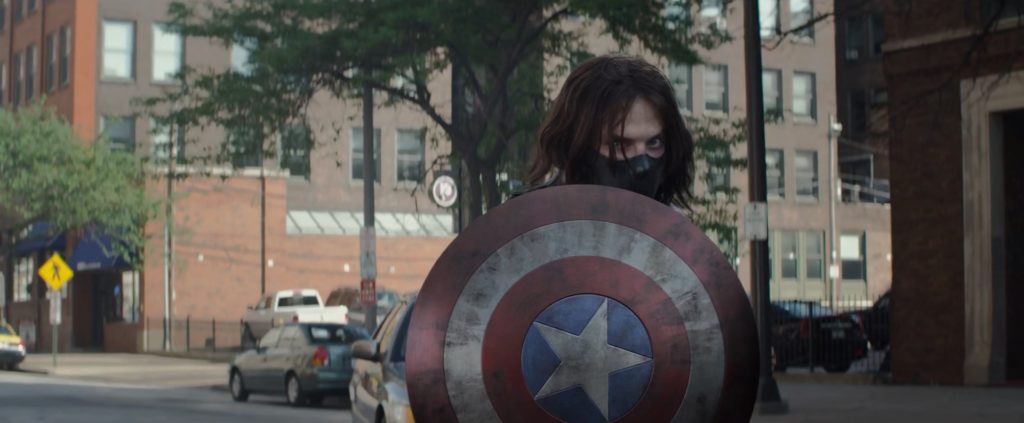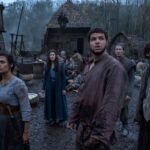In this weekly series, we chronicle the long road undertaken by the Marvel Cinematic Universe movies to arrive at Avengers: Infinity War. We introspect and discuss the movies from a critical and commercial standpoint while also considering the development efforts that went behind them. These articles may be occasionally sprinkled with spoilers so please make sure to skip the relevant sections when reading.
This post is about the 2014 movie Captain America: The Winter Soldier, the ninth chapter in the Marvel Cinematic Universe.
Back in 2014, the world was coming to terms with an important revelation. Edward Snowden, a computer professional under employment of the United States’ National Security Agency (NSA) had leaked an extensive dossier exposing the covert tactics and means employed by the NSA to spy on US citizens. While the disclosure itself happened in 2013, the world dealt with its aftermath for a very long time, long enough for the second installment in Marvel’s Captain America franchise to hit theaters. To think that this entertaining popcorn superhero movie targeted at the masses would be tackling such an important issue in a rather interesting way could either be a hearty coincidence or a carefully executed masterstroke, whichever way you look at it.
In retrospect, 2014 was a great year for Marvel in terms of critical acclaim. Both its 2013 movies Iron Man 3 and Thor: The Dark World never quite hit it off with critics the way its 2014 movies did, box-office success notwithstanding. Marvel Studios was also in a comfortable position of churning out two movies a year, attempting to expand the world inhabited by each of its characters by bringing in new elements into their mythos, unafraid to play with decades-old conventions. With Iron Man 3, Marvel did an ambitious take on The Mandarin, one that went completely in the face of the character’s traditionally Chinese origins. And with Captain America: The Winter Soldier, Marvel was about to shatter what had essentially been the core connective tissue linking each of its Phase One movies: the organization S.H.I.E.L.D.
Adapted from Ed Brubaker’s critically acclaimed comic book arc The Winter Soldier, the sequel to Captain America: The First Avenger expertly blends in surveillance issues and the S.H.I.E.L.D. subplot and interweaves it with the story of the HYDRA trained assassin. As a response to the now famed Battle of New York, S.H.I.E.L.D. is on the defensive, looking to preemptively end menacing situations. Nick Fury plans to launch three Helicarriers equipped with state of the art targeting algorithms to wipe out and neutralize threats before they even happen. Steve Rogers, vehemently against this, forces Fury to reconsider his decision which he does, only to become a target pursued by unknown assailants. At the center of it all is Fury’s superior, mentor and friend Alexander Pierce who tries to side with Fury and support his decision, although things are not as they seem.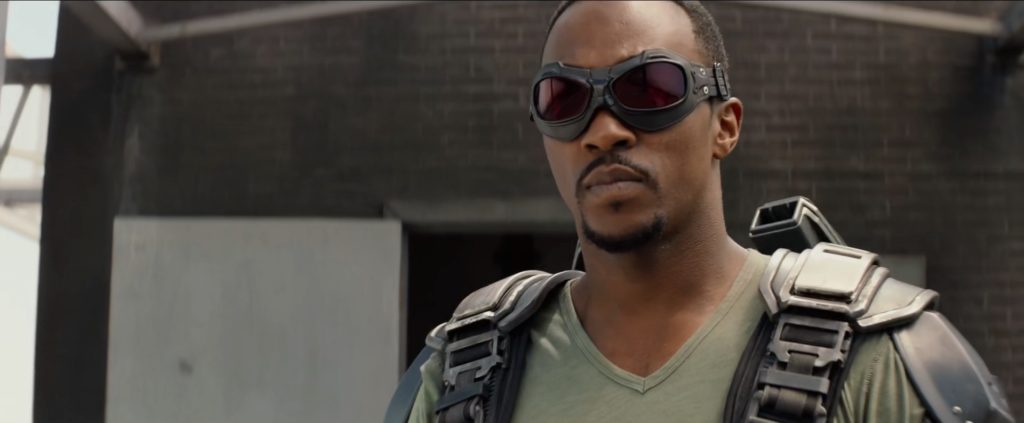
In the years gone by, someone within the very-much alive HYDRA has been enlisting the services of a mysterious assassin known as The Winter Soldier. For those still unfamiliar with his identity, skip the rest of this paragraph. Rogers is astonished when he realizes this brainwashed hired gun is none other than his lost best friend, Seargent James Buchanan “Bucky” Barnes who fell down the alps in one of their missions together. Turns out when Arnim Zola captured Bucky’s unit, he did some experimentation on him (briefly hinted at in the first movie) which helped Bucky survive the fall. He’s taken in by HYDRA and trained to do nothing but ruthlessly kill, awakened in between missions and put on cryogenic freeze until needed again. Aiding Captain America in his efforts is Sam Wilson, an ex-para rescue military man who now spends time counselling people and helping them overcome their post-traumatic stress disorders, having gone through a lot himself.
Arguably, one of the biggest contributions of The Winter Soldier is in handing the MCU two supremely talented directors. The brothers Anthony & Joe Russo take the essence of Captain America’s character and thrust him into the modern world, one where things are not as black and white as they were back during World War II. This is a world where a fine line of grey separates malevolence from benevolence and Cap frequently finds himself walking a tight rope between the two sides. His belief is shaken further after some troubling revelations about the organization he was working for. As a soldier for hire, Cap believes in following orders but starts doubting the commanders. Adjusting to the modern world is tough as it is and Rogers must now content with the complex morality that pervades this urban Washington he’s a part of. It’s a dilemma that is brought out quite subtly at times and not so subtly at others by the directors with support from writers Christopher Markus and Stephen McFeely who supply strong moments to guide the narrative through those complexities. And having been with the character since his first solo outing and done a few uncredited writes and rewrites along the way for the MCU at large, the writer duo present viewers with their finest material yet.
There’s also something to be said about the duality of the subject matter chosen by the team of Christopher Markus, Stephen McFeeley, Anthony Russo & Joe Russo. The positives of Project Insight – eliminating threats before they inflict casualties – has its root in several precognition based movies, most notably Steven Spielberg’s Minority Report, which takes the concept several steps further establishing a PreCog crime division. These positives are spelled out in the movie through the eyes of S.H.I.E.L.D. director Nicholas J. Fury and Alexander Pierce. Pierce even explains this by posing the question of what would you do if you knew Pakistani terrorists were going to march into Mumbai. Surely a compelling argument to carry on with the program. The counter-side though is that to be able to pinpoint such threats means keeping people under surveillance 24 hours a day without their consent, which gives rise to whole set of ethical debates. As Steve Rogers puts it, “This isn’t freedom. This is fear.” What then does one choose? Sacrificing some freedom at the cost of safety? Or keeping our privacy while risking security and restricting authorities into reactive mode? It’s a tough choice and this dichotomy raises interesting questions, with the dialogues often doing them justice.
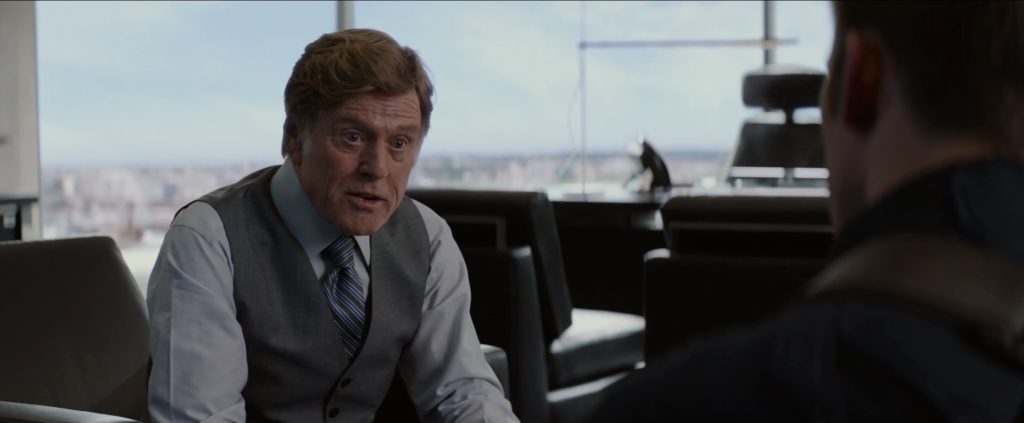 One of the few noticeable aspects about their directorial style is that the Russo Brothers seem to favor character interactions and moments of quiet over action sequences, something that shows in how quickly they tend to skim over the action beats and how sufficiently long they let the character moments play out. Not that the action is bad; if anything, the fights are intense and the quick cuts only add to the intensity. More importantly, the action always feels organic to the plot and is guided by where the characters are in the movie’s narrative. It’s this fine balance between action and character that makes the brothers such wonderful directors; they allow the right scenes to play out in detail. For a 2 hour 20 minute movie, that means plenty of sequences of drama which is a delight to witness in a bid-budget movie.
One of the few noticeable aspects about their directorial style is that the Russo Brothers seem to favor character interactions and moments of quiet over action sequences, something that shows in how quickly they tend to skim over the action beats and how sufficiently long they let the character moments play out. Not that the action is bad; if anything, the fights are intense and the quick cuts only add to the intensity. More importantly, the action always feels organic to the plot and is guided by where the characters are in the movie’s narrative. It’s this fine balance between action and character that makes the brothers such wonderful directors; they allow the right scenes to play out in detail. For a 2 hour 20 minute movie, that means plenty of sequences of drama which is a delight to witness in a bid-budget movie.
Another aspect (among the many) that elevates the movie in my eyes over its predecessor has to do with Henry Jackman’s music. Undeniably, Alan Silvestri’s score for the first movie was commendable, his Captain America theme being a rousing orchestral assembly of tunes that would serve to bring out the patriotic hero within one and all. But Jackman’s score transcends Silvestri’s and fits the present-day aesthetic of the movie to perfection, while still not forgetting what makes Captain America – a good heart. The Smithsonian exhibit track is a fabulous example of this: It has as much, if not more emotions than Alan Silvestri’s original Cap theme. There are some other fabulous pieces which have their DNA in Hans Zimmer’s score for Christopher Nolan’s The Dark Knight but leave a mark when listened to in isolation. Background scores for the opening Lemurian Star sequence and Fury’s street chase are full of momentum while The Winter Soldier’s theme is screeching and haunting and yet disturbingly erratic in its composition. This movie is a fine example of those who nitpick at the lack of memorable music in the MCU.
What’s also pleasantly surprising is how little the directors left out on the cutting room floor. There are only 3 minutes’ worth of deleted scenes meaning pretty much everything the Russos wanted to be in the movie made it in. There were opportunities here and there to cut sequences and reduce the running time but the Russos avoid any shortcuts to the finish line. For instance, under the production of a different studio, the entire flashback sequence between Rogers and Bucky could’ve gotten the ax given that it slowed down the movie’s pacing. However it would’ve consequently made Steve supporting Bucky in the climactic moments seem hollow which is why I’m glad the Russos stuck to their guns.
The Winter Soldier has some of the strongest character development seen in any Marvel Studios movie to date. It delves a mighty lot into the backstories of characters, even giving Fury some background to work with. Because of this we learn about Fury’s grandfather’s bad-ass moment as well as Fury’s history with Pearce along with hints of how Fury lost his eye. If you thought The Avengers gave Fury a lot to do, you would do well to reconsider your opinion. Jackson is of course a delight in his sequences and owns Fury by now like it’s an extension of his natural self. Similarly, Scarlett Johansson gets plenty to play around with as Black Widow and she triumphantly delivers on all fronts. Oh, and did I mention there’s a truly heartbreaking cameo by Hayley Atwell as an aged Peggy Carter that will tug along your emotional strings. Even new character Sam Wilson has plenty of scenes elaborating his background and giving him his own tragic backstory involving his ex-military friend who succumbed to a mission forcing Wilson’s retirement. Anthony Mackie exudes a natural warmth in his performances and instantly shares a brotherly camaraderie with Rogers which reflects on screen. Pearce has his own life history to share as well which he uses to justify his actions and Robert Redford has fun with the character and gives a competent performance.
The main thread of the movie is really about the relationship between Steve and Bucky, and both show immense growth in their respective roles. Sebastian Stan is virtually unrecognizable as Bucky and if you hadn’t seen the trailers or read the comics, you’d be hard-pressed to spot him as the titular Winter Soldier. Conveying a brainwashed HYDRA assassin with a sense of cold menace while still hinting at sparks of Bucky being alive within him, Stan gives a laudable performance without necessarily going over the top (save for the climax although those moments are understandable). Finally, Rogers absolutely kills it with his restrained portrayal as Cap, trying to adjust to the modern world doing missions for S.H.I.E.L.D. and struggling to find a sense of morality in a world that increasingly continues to baffle and confound him. Very cutely, he maintains a diary of things he missed out on and the contents of the said diary change depending on which country you watched the movie in.
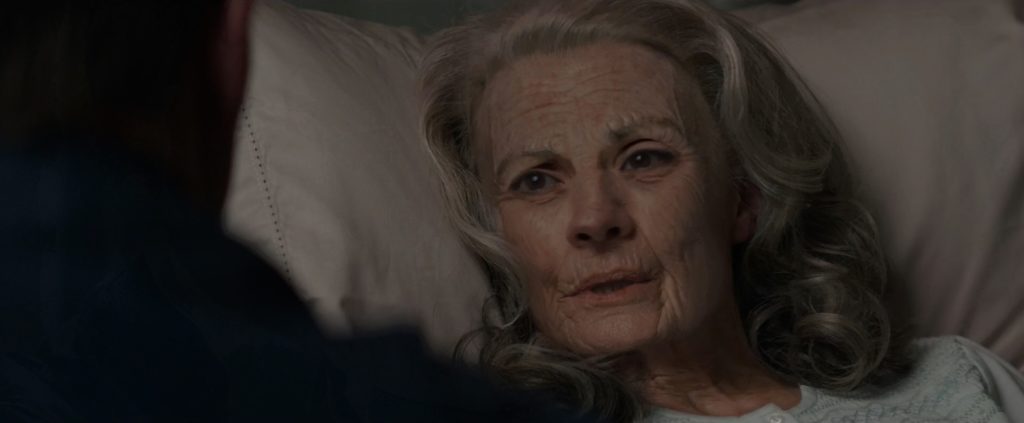 With all elements in place, Captain America: The Winter Soldier was without doubt a resounding success. It earned the most critical acclaim of any Marvel Studios movie to date and garnered praise for its outstanding production values, visual effects and most importantly the strong characters and narrative that eerily mirrored a similar crisis in the real world. It went on to more than double the gross of its predecessor and ended its box-office run with a $714 million haul. The Russo Brothers were warmly welcomed in the Marvel family and were on to stay as they would soon begin their work on the third Captain America movie.
With all elements in place, Captain America: The Winter Soldier was without doubt a resounding success. It earned the most critical acclaim of any Marvel Studios movie to date and garnered praise for its outstanding production values, visual effects and most importantly the strong characters and narrative that eerily mirrored a similar crisis in the real world. It went on to more than double the gross of its predecessor and ended its box-office run with a $714 million haul. The Russo Brothers were warmly welcomed in the Marvel family and were on to stay as they would soon begin their work on the third Captain America movie.
Meanwhile, if you thought this was the best Marvel Studios had to offer in 2014, you’d once again be mistaken. Despite its outstanding narrative sense, The Winter Soldier was still confined to the realms of recognizable blockbuster spectacle and Captain America was a known name. Marvel Studios was in a mood to outdo itself and about to introduce a bunch of misfits, not just among themselves but in the superhero world at large.
And viewers? They were about to experience and get hooked onto a feeling.

